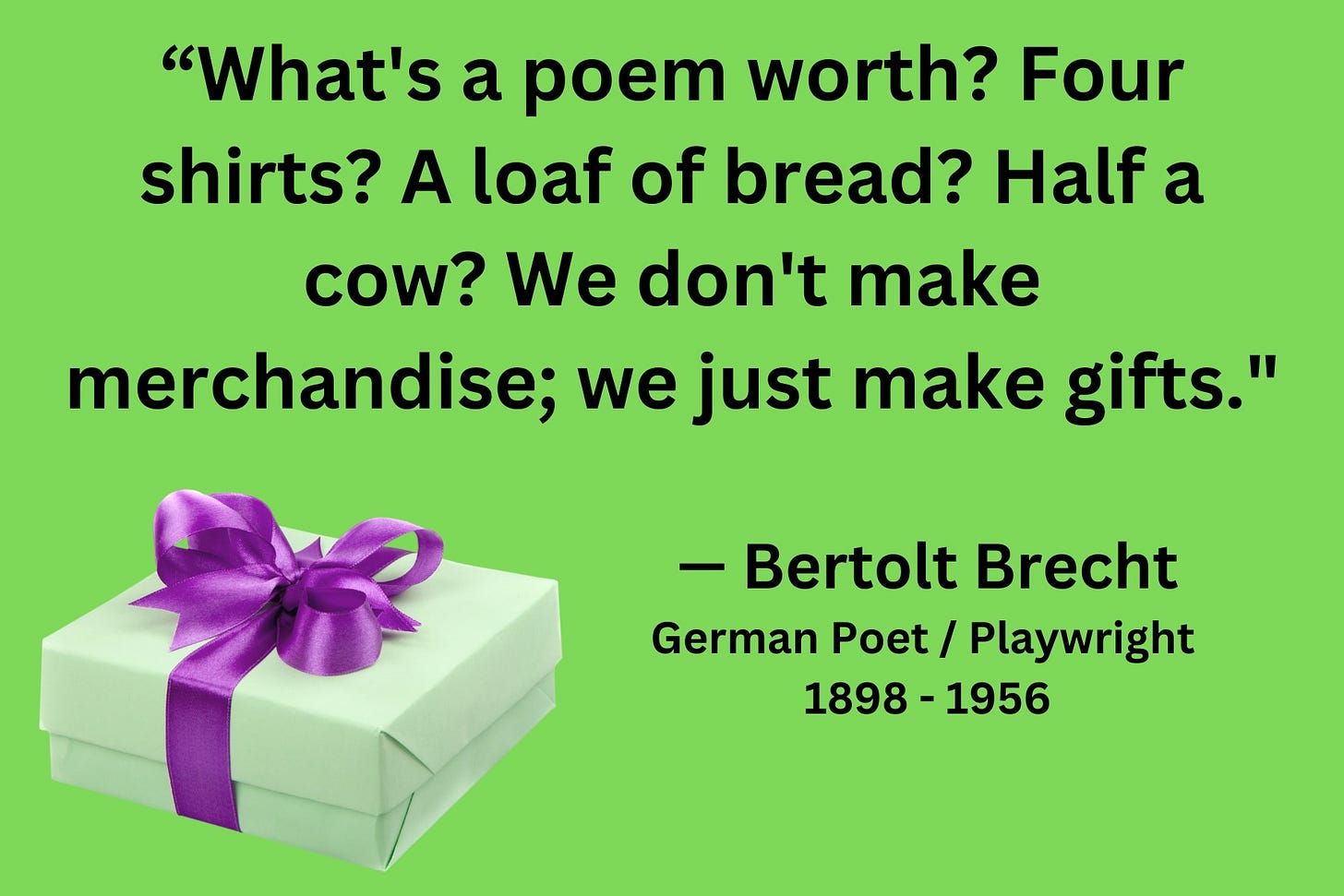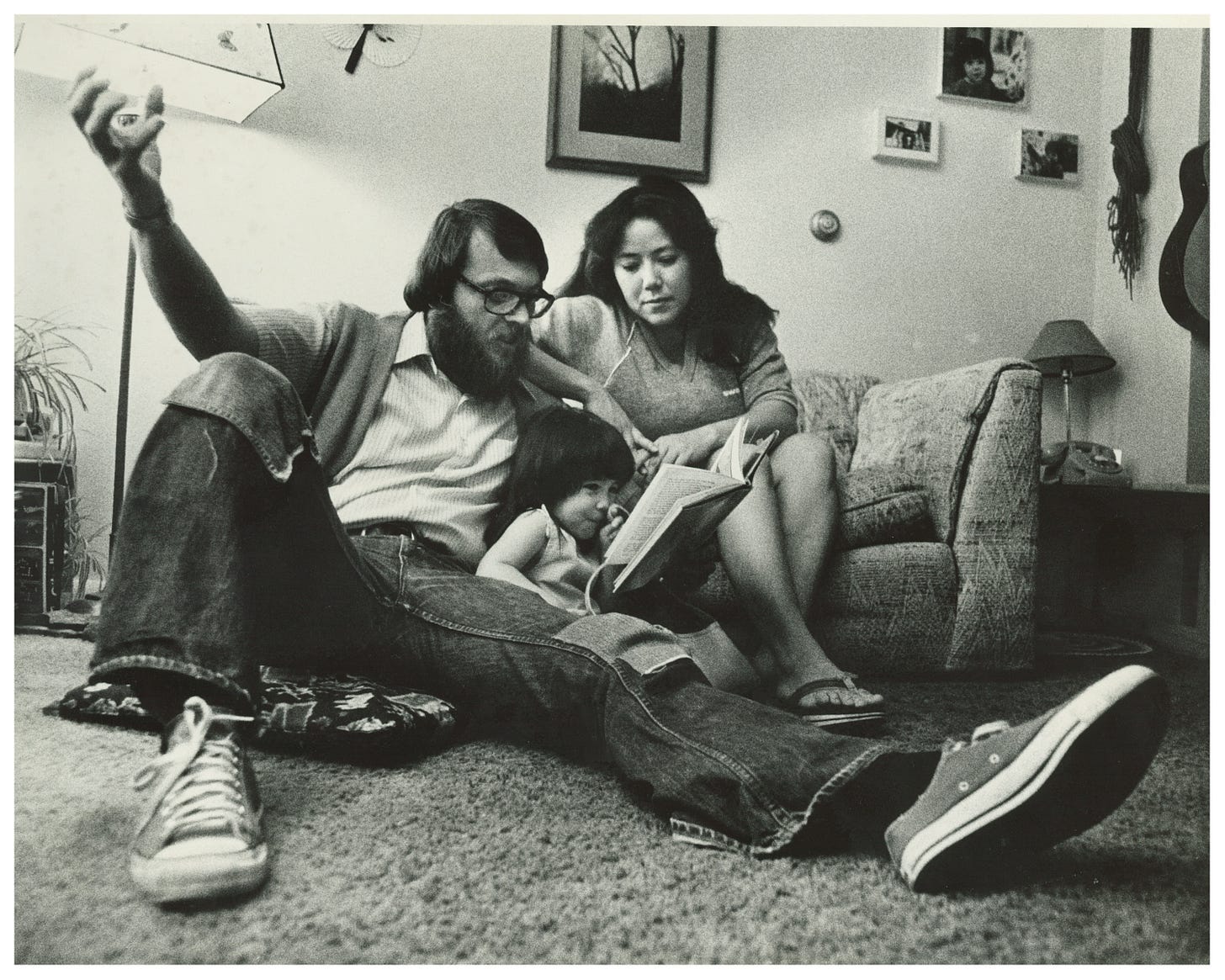What is a poem worth?
What is a poem worth to you? How much are you willing to spend to read a poem? Can you put a price on a poem? Is it a commodity like milk or eggs or a new car? I can buy a gallon of milk for $3.99. Is that what a poem is worth? I recently rented a car for $60 a day. Is a poem less valuable than one day of transportation? My hotel room cost me $160 a night, excluding taxes. Is a poem less valuable than a good night’s sleep?
The American society puts a dollar value on almost everything. The price of weddings is going through the roof, but be careful; divorce costs even more. What price is love? How about sex? Even dying costs thousands of dollars. If I ask to be buried in a coffin made of poetry books, it would be cheaper than buying a new coffin.
What does a haircut cost you? Or a pedicure? Or a day at the spa? A Swedish massage costs me $75 for one hour. I could probably buy five books of poetry for that amount. Poetry can nourish my soul, change my life, and teach me to see the world differently. So, what is a poem worth?
What is Wayfarer?
Wayfarer is a newsletter where I share my poetry, personal stories, and the occasional opinion piece.
Why subscribe?
When you subscribe to Wayfarer, you are giving yourself a gift that includes:
Knowledge,
Wisdom,
Hope,
Inspiration, and
Motivation.
(Photo taken in 1980 after I published my second book of haiku, Empty Playground)
Why do I write and publish poetry?
I have been writing for over fifty years.
Haiku
In the early years of my writing career, I focused solely on writing, reading, and rewriting haiku. During a seven-year period, I published over 125 haiku in more than 25 magazines, including Modern Haiku, Dragonfly, and Cicada. (This was prior to the internet when poetry magazines were still published in hard copy.)
Some of my haiku from this time have more than 20 versions. Often, I would only change one or two words. The importance of rewriting was drilled into me in college. Like many writers, I love the initial spark of creativity and don’t particularly like the rewriting.
Writing haiku taught me the importance of concrete images and the juxtaposition of those images. Haiku is grounded in the physical world. I also learned to use words with 2 or 3 syllables and avoid complex, multiple-syllable words. Writing haiku taught me the importance of the economy of words. The fewer words, the better.
Here are three of my haiku from that time:
clinging to a weed
shell of a grasshopper…
autumn winds
soft spring rain
soaks into the fresh dirt…
a child’s grave
the bearded old man
hand in hand with the woman—
full autumn moon
Seven-Line Poem
After seven years, I felt confined by the short haiku form and looked to expand it. I played with combining three haiku into one poem. This longer nine-line poem slowly evolved into a seven-line poem with three couplets and a closing line. The first two couplets present an image that is juxtaposed with the image in the third couplet. The closing line ties the couplets together and takes us in another direction. Like haiku, the poem has no title. Here are three examples:
A Chinese kite
weaves
across a blue sky
like a mother
in search
of a lost child.
I cling to the warm hand of my daughter.
A cold winter wind
nips at my ears
as I circle the house
again and again.
Courage finds its beginnings
in small acts of the heart.
I steal a lampshade from her new lover.
Dreams are like
trading baseball cards
with a best friend
on a Saturday afternoon:
only the bargaining
counts for anything.
I pray for the life of my dying son.
Twenty-Line Poem
I realized that many poetry magazines stated in their submission guidelines that poems should be 20 lines or less, so I changed the length of my poems again. Here is an example.
Fireflies
A sip of hot tea,
a handful of walnuts —
my dinner tonight.
I watch the sunlight
fade from the sky
and applaud the fireflies
in their flights of sexual
fantasy. She sleeps for now —
the pain dulled by the morphine,
the screams quiet and hidden,
only the restless turning
of her body. I mumble
a few words in my clumsy
attempt at prayer, my reaching
for comfort in old rituals
that no longer have meaning.
I beg for mercy and that
her death be quick, without
too much discomfort. I catch
a firefly with my bare hands.
Fireflies was written at 9:45 pm on June 15, 2006. (I date and sign all my poems in my journals, and I have over 20 journals filled with poems. I did not start writing in journals until 2006.) On June 16, 2006, I was told by my doctor that I had prostate cancer. I was 57.
So, what you find in Fireflies are images juxtaposed. I begin with hot tea and walnuts, my evening meal. Then I mention fireflies, whose blinking lights are a mating call. Next comes the image of a dying woman (wife) sleeping. Then, there is the image of a man attempting to pray. The last image is of the man catching a firefly.
All these images work together to create a story in the reader’s mind. The reader may not grasp the story consciously, but subconsciously, the reader will experience the emotion.
So, what does this poem mean? I think it is a glimpse into a moment in a man’s life when his wife is dying, and he finds hope in the world of fireflies and summer nights.
My Writing Process
There are a few things that you need to understand about my writing process. First, I don’t plan my poems. I sit down and begin to write and I let my subconscious take over. One image leads to another. I have no idea where a poem is going.
Secondly, I don’t do a lot of rewriting. Instead, I focus on the initial creation. Since many of my poems have similar themes, I see the creation as a rewrite. Every time I create a poem, I am rewriting something I have written before. Since I write my poetry in longhand first, the only rewrite occurs when I type it, and usually, that is a correction of spelling or a change in the length of a line.
Third, most of my poems are fictional. I am not the person in the poem even though it is written in first person. I may have experienced some of the things in the poem. I have drank hot tea and eaten walnuts. I have captured fireflies. But my wife of more than 50 years has not died, although, I have thought about what I would do if she did. I have found myself attempting to pray in a crisis, even though I lost my faith when I was seventeen.
Fourth, I am a speaker and have been speaking for over 30 years. Speaking is different than writing in that the language is usually simpler and more repetitive. I think that my speaking style has unconsciously influenced my writing style. Many of my poems are meant to be read aloud.



